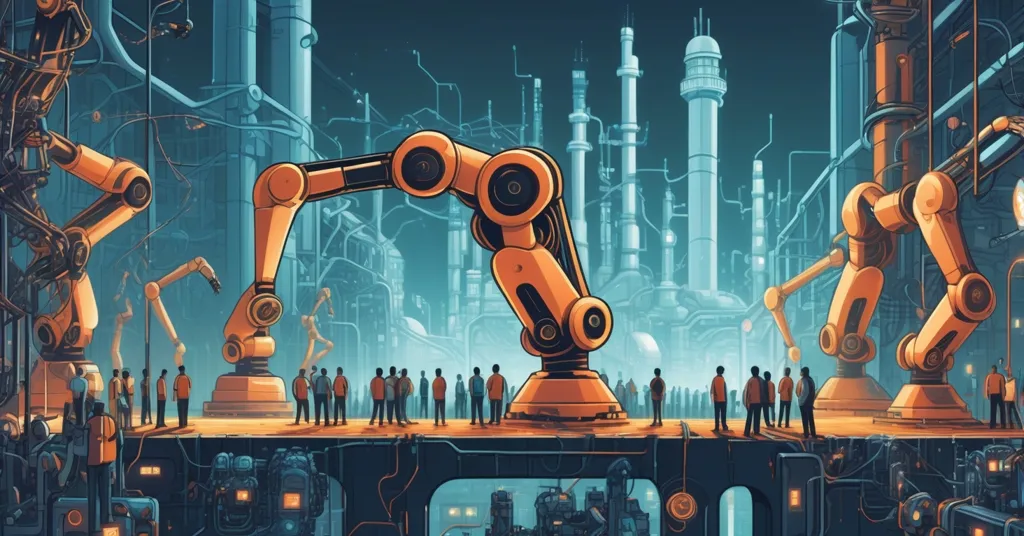David Sacks Rejects UBI as AI Job Losses Spark Decentralized Solution Talks

David Sacks Slams UBI as AI’s Future Becomes a Battleground of Visions
David Sacks, recently named President Donald Trump’s AI czar, has ignited a firestorm with his June 4th rejection of Universal Basic Income (UBI), branding it a “post-economic order fantasy” unfit for an AI-driven world. As automation reshapes economies and sparks polarized dreams of utopia or dependency, Sacks’ hardline stance forces us to confront the messy reality of technological disruption—a reality that hits close to home for anyone tracking Bitcoin, blockchain, and the fight for decentralized freedom.
- Sacks’ Critique: Dismisses UBI as unsustainable, rejecting welfare-heavy visions of an AI future.
- Job Losses: AI slashes opportunities, with a 19% drop in automatable job postings and freelancer earnings down 5.2%.
- Decentralized Potential: Blockchain-based UBI experiments could offer alternatives to flawed government handouts.
Sacks’ Hardline Stance: UBI as a Dangerous Delusion
Sacks isn’t playing nice. His framing of AI’s future as a “Rorschach test”—a psychological inkblot where people see what they want—cuts to the heart of a divided debate, as highlighted in a recent analysis of his perspective. On one side, he argues, certain groups, especially on the political left, fantasize about a world where work vanishes, replaced by government checks that keep everyone fed while machines hum away. For Sacks, this isn’t just impractical; it’s a slap in the face to the grit of self-reliance. He believes able-bodied Americans should harness tech to build, not sit back on handouts. His blunt statement on X laid it out: UBI risks putting millions on permanent welfare, a betrayal of economic sense and core values.
Let’s unpack UBI for the uninitiated. Universal Basic Income means everyone gets a regular cash payment from the government, no strings attached, to cover basic needs regardless of whether they work or not. It’s pitched as a safety net for when AI and automation wipe out traditional jobs. Sacks, however, sees it as a slippery slope to a society hooked on state support, a view that resonates with those of us who champion decentralization over bureaucratic overreach. But is he ignoring real displacement, or calling out a fantasy before it spirals out of control? For more on his critique, check out this detailed breakdown of his recent statements.
The UBI Debate: Utopia or Dependency Trap?
This isn’t a new fight. UBI roared into the spotlight in the late 2010s as fears of automation grew. Tech heavyweights like Elon Musk, vocal since 2016, and Mark Zuckerberg, endorsing it in 2017, argue that AI’s job-killing march demands a way to redistribute the wealth from skyrocketing productivity. Musk’s logic is simple: if robots take your gig, society owes you a lifeline. Yet, let’s not pretend this is pure altruism—when billionaires push handouts while their AI tools axe jobs at Tesla or Meta, you’ve got to wonder if it’s a heartfelt fix or a slick PR dodge. Community discussions, like those on Reddit about Sacks’ take on AI and UBI, reflect this skepticism.
On the other side, political resistance is fierce. States like Arizona banned basic income programs in 2024, with Iowa, Texas, and South Dakota echoing the pushback, arguing it kills the drive to work and breeds reliance on government. Historically, UBI proposals like Andrew Yang’s 2020 “Freedom Dividend”—a $1,000 monthly payout for every adult—were dismissed as pipe dreams by critics like then-Vice President Joe Biden. Still, small-scale experiments with guaranteed basic income in U.S. cities often show recipients gaining stability and even working harder, as a study funded by OpenAI’s Sam Altman found. So, is Sacks blind to data, or is scaling UBI to millions a recipe for fiscal disaster? For varied opinions, see this Quora thread on UBI in the AI era.
AI’s Brutal Impact: Jobs Vanishing in Real Time
While ideology battles rage, AI’s footprint is already crushing livelihoods. Economist Zanele Munyikwa from Revelio Labs reports a 19% drop in online job postings for tasks AI can handle over the past three years, as detailed in a recent Revelio Labs report. Zoom in, and it’s grimmer: roles highly exposed to automation—like data entry or customer service—plunged 31%, compared to a 25% dip for less vulnerable jobs. Freelancers feel the burn too. A 2023 study linked a 2% drop in writing gigs and a 5.2% earnings cut on platforms like Upwork directly to ChatGPT’s rise. Picture a graphic designer or writer watching clients turn to algorithms for cheap, quick work—that’s not a distant dystopia; it’s today. For broader insights, explore these statistics on AI’s impact on employment.
Real-world fumbles amplify the chaos. Fintech firm Klarna swapped out 700 customer service agents for AI, chasing efficiency, only to backpedal when service quality cratered. They rehired humans to fix the mess, but CEO Sebastian Siemiatkowski still plans to slash at least 500 jobs in the next year as AI “improves.” It’s a brutal cycle: cut costs, botch quality, rinse, repeat. Then there’s IBM, which leaned on AI for HR processes, only to face employee backlash over depersonalized decisions—another sign that tech’s promise often stumbles on human nuance. These aren’t hypotheticals; they’re warnings.
Optimistic Counterpoints: AI as a Job Creator?
Not everyone’s sounding the alarm. Google DeepMind CEO Demis Hassabis paints a brighter picture, insisting AI will spawn “new, even better” roles, just as the internet birthed careers no one foresaw in the ‘90s. He sees future generations as “AI natives,” adapting to algorithms like we did to smartphones. Hassabis even toys with a “universal high income” concept—less about basic survival, more about elevating everyone’s potential. It’s a seductive idea, echoing how the industrial revolution, despite early pain, eventually unleashed waves of opportunity through unforeseen trades like engineering or logistics.
But when your Upwork account’s drying up because a bot undercut you, “wait for the future” feels like a cruel jab. History shows tech disruption often leaves casualties before the gains kick in—think of the Luddites smashing looms in the 1800s, desperate as machines ate their craft. Hassabis might be right long-term, but short-term pain is real, and Sacks’ silence on bridging that gap is deafening.
Can Blockchain Offer a Decentralized Fix?
Here’s where our world of Bitcoin and blockchain sneaks in with a potential lifeline. If Sacks hates government handouts—and we often rail against centralized overreach—could decentralized systems address AI-driven inequality without the baggage? Crypto projects like Circles UBI or GoodDollar are experimenting with token-based income distribution on platforms like Ethereum. Circles, for instance, uses a web of trust where users vouch for each other to receive tokens via smart contracts, cutting out state middlemen. It’s raw and unscaled, facing hurdles like adoption and volatility, but it aligns with empowering individuals over institutions. For deeper dives into such ideas, check out this Reddit discussion on blockchain solutions for job displacement.
Bitcoin itself might not directly fuel UBI—its store-of-value ethos doesn’t scream “monthly payouts”—but Ethereum’s flexibility with programmable money opens doors BTC can’t. Imagine AI-driven wealth funneled through decentralized protocols to those displaced, bypassing Washington’s red tape that Sacks and many of us despise. It’s not a full fix; scams and tech barriers persist in crypto too. Yet, it’s a middle finger to bloated systems, a nod to freedom and privacy we champion. Could Sacks, with his tech roots, grudgingly respect a model that sidesteps state control? For more on this intersection, explore this analysis of blockchain and AI job displacement solutions.
Commentator James Surowiecki pointed out a glaring hole in Sacks’ rhetoric on X, saying:
Very weird, and telling, tweet: Sacks says that the future of AI is a Rorschach test, and describes what he thinks the left sees, but then says nothing about what he, or other RWers, think an AI-dominated society should look like.
He’s got a point. Sacks torches the welfare vision but offers no blueprint. Does he push retraining, entrepreneurship, or pure market chaos? His tech background—founding PayPal and backing startups—suggests he might lean toward innovation over safety nets, but without clarity, it’s just guesswork. Meanwhile, voices like DOGEai on X offer a practical spin:
AI should empower American workers to achieve more, not become an excuse for permanent handouts. The only ‘post-economic order’ we need is one where Washington stops looting productivity through red tape and misguided priorities.
That cuts to the decentralization fight—strip away the state’s chokehold and let tech breathe. It’s a sentiment Bitcoin OGs can vibe with, even if AI, not crypto, is the trigger here.
Navigating the Chaos: Key Takeaways and Questions
AI’s storm is brewing, mirroring crypto’s own clash of disruption versus stability. Sacks may scoff at UBI, but the numbers scream urgency: automation is gutting jobs faster than utopian “AI native” dreams can materialize. Whether through blockchain, policy, or raw hustle, solutions better emerge quick. Let’s break down the critical questions and insights to ground this mess.
- What’s David Sacks’ core issue with Universal Basic Income?
He labels UBI a “post-economic order fantasy,” arguing it’s unsustainable and risks crafting a society reliant on welfare, clashing with self-reliance values for able-bodied workers. - How is AI impacting jobs right now?
It’s brutal—job postings for AI-automatable tasks dropped 19%, high-exposure roles fell 31%, and freelancers on Upwork saw a 2% job loss with a 5.2% earnings hit since ChatGPT emerged. - Why are U.S. states rejecting UBI programs?
States like Arizona, which banned such programs in 2024, along with Iowa, Texas, and South Dakota, claim UBI fosters government dependency and dulls the incentive to work. - Could blockchain provide a solution to AI-driven job displacement?
Yes, in theory—decentralized UBI models using crypto tokens or Ethereum smart contracts could deliver value directly to individuals, dodging centralized welfare pitfalls and upholding freedom and privacy. - What are the competing visions for AI’s societal role?
Sacks critiques a left-leaning dream of a jobless, handout-driven world, while optimists like Demis Hassabis foresee new, valuable roles; cases like Klarna reveal AI’s cost-cutting appeal and its frequent quality failures.
The AI debate isn’t just tech—it’s a cultural and economic warzone, much like Bitcoin’s fight against fiat control. Will automation usher in abundance, or leave workers stranded while moguls muse about charity? If AI’s an inkblot, Sacks sees a grind, Musk sees a paycheck, and the rest of us? We’re stuck figuring out how to not get smeared. Blockchain might be one tool to redraw the lines, but only if we cut through the hype and face the storm head-on.



